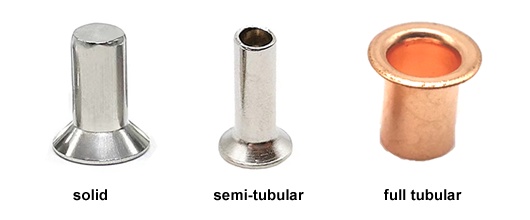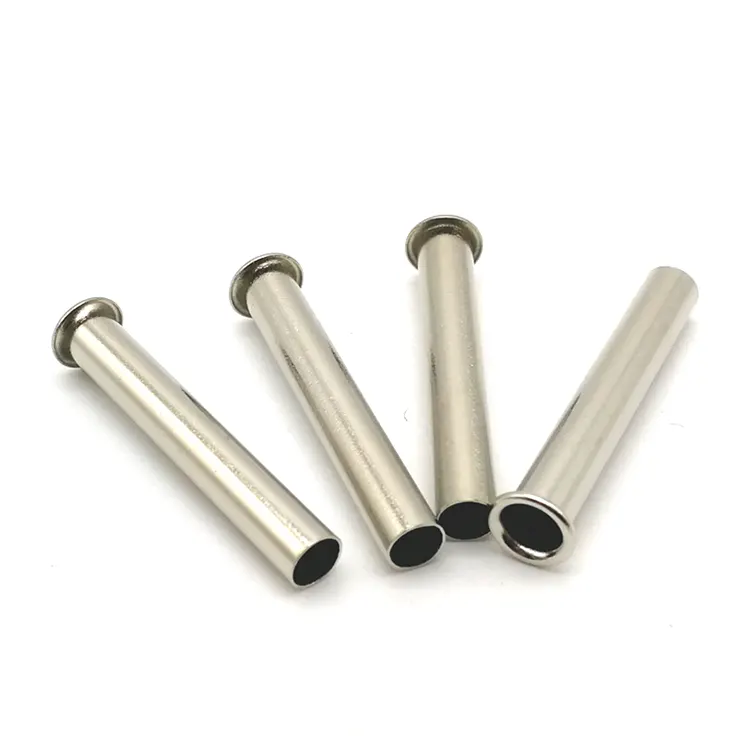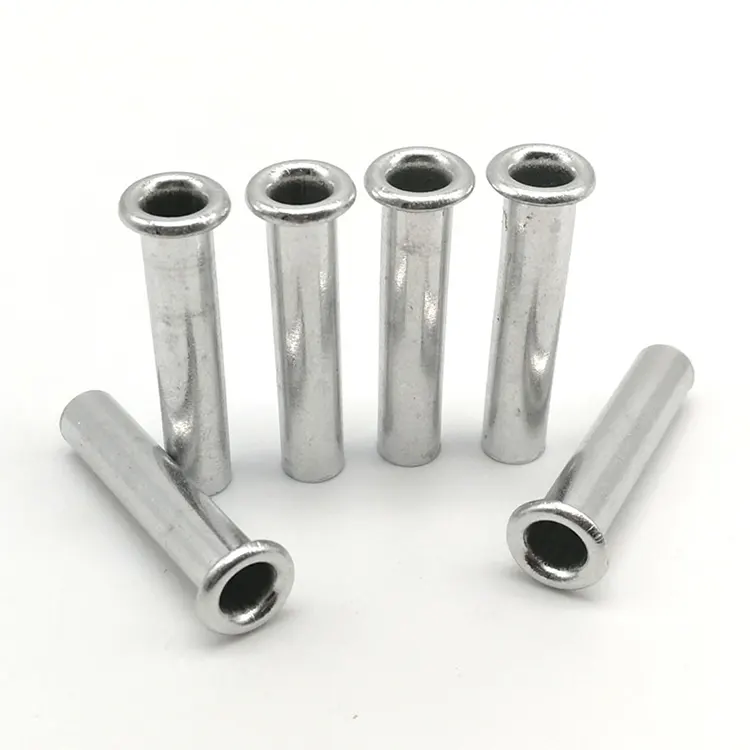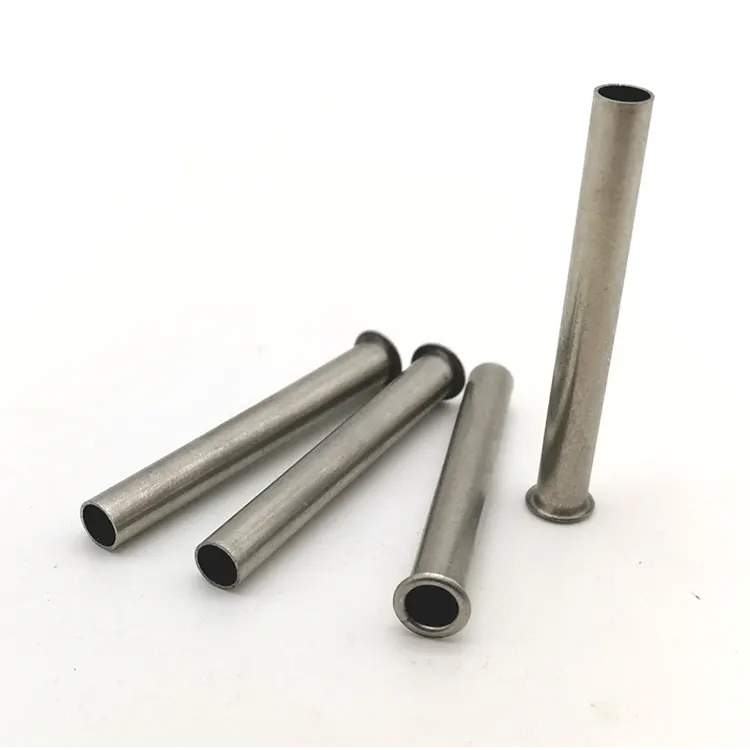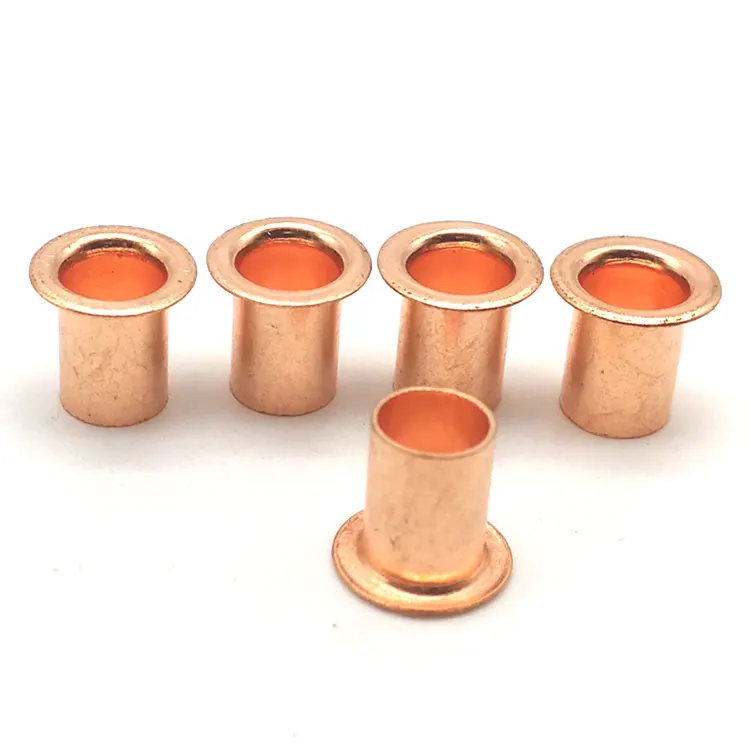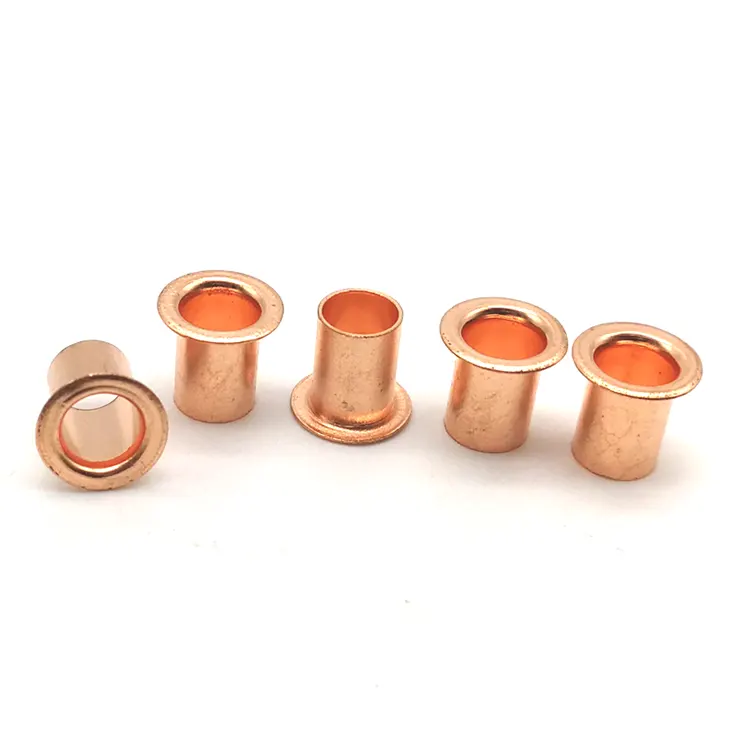Rivets
As one of professional manufacturer in China, Notin would like to provide you Rivets. And we will offer you the best after-sale service and timely delivery.
What is a rivet?
A rivet is a permanent mechanical fastener used to join two or more materials. Rivets work by inserting a metal pin into an aligned hole and deforming the end, creating a strong, secure, and durable connection. Unlike temporary fasteners like screws, rivets do not rely on threads, but instead form a permanent connection, making them ideal for applications requiring high strength, durability, and vibration resistance.
Classification of Rivets
Rivets are typically categorized by head shape, degree of hollowness, or material.
Based on head shape, rivets can be classified as flat head rivets, round head rivets, countersunk head rivets, mushroom head rivets, universal head rivets, truss head rivets, etc.

Based on degree of hollowness, rivets can be classified as solid rivets, semi-tubular rivets, or full tubular rivets.
Based on material, rivets can be classified as brass rivets, stainless steel rivets, steel rivets, aluminum rivets, copper rivets, etc.
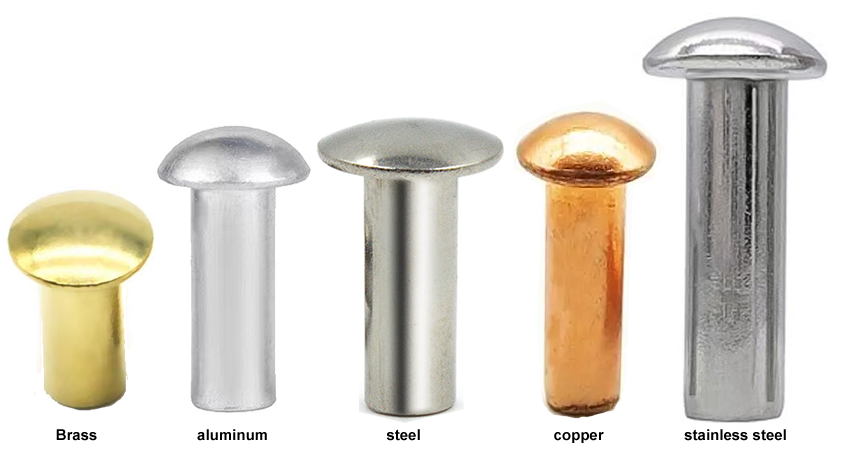
What surface finishes are available for rivets?
Rivet surfaces are typically treated with rust-proofing treatments, primarily electroplating, including zinc plating, nickel plating, chrome plating, tin plating, gold plating, and silver plating. Electroplating is a common rust-proofing method for rivets. It applies a layer of plating to the rivet surface through physical or chemical methods. The plating effectively prevents corrosion and rust, while also providing a certain aesthetic effect.
Another special surface treatment method is head coating. Head coating is performed after the rivet is electroplated. This allows for a variety of colors on the rivet head, achieving an aesthetically pleasing finish.
Aluminum rivets cannot be electroplated, but they can be anodized. Anodizing also allows for a variety of color options, but the unit price is higher than electroplating.
Rust-proofing the rivet surface is crucial, effectively extending the rivet's service life and ensuring a secure connection. Different rust-proofing methods are suitable for different environments and applications, so the choice should be tailored to the specific situation.
- View as
Rivets en tube en acier
Les rivets en tube en acier sont un type de fixation métallique qui atteint la connexion par déformation d'estampage. Ils sont constitués d'une tige tubulaire creux et d'une tête de capuchon d'extrémité, et appartiennent à la catégorie de fixation creux dans le domaine de l'ingénierie mécanique. Les métaux nuées offrent ce type de rivets en tube en acier à Dongguan, en Chine, pendant plus de 10 ans. Bienvenue pour nous envoyer votre conception.
En savoir plusenvoyer une demandeRivets creux en acier
Nuote Metals est spécialisé dans la production de rivets creux en acier. Nous sommes situés à Dongguan, en Chine. Il existe deux techniques principales pour produire des rivets creux en fer. L'une consiste à utiliser des tuyaux en fer, qui conviennent aux rivets plus longs. L'inconvénient est que l'exigence de quantité minimale d'ordre est relativement élevée. L'autre consiste à utiliser des techniques de dessin en profondeur. Nous donnerons des suggestions appropriées sur les techniques à utiliser en fonction des circonstances spécifiques du client.
En savoir plusenvoyer une demandeRivets en tube en acier inoxydable
Les métaux Nuote produisent des rivets en tube en acier inoxydable en Chine, les rivets en tube en acier inoxydable sont l'un des connecteurs couramment utilisés. En raison de la conception creuse, ils sont de petite taille et de poids léger, ils peuvent résister à des charges de pression et de traction plus élevées sans se casser ou se déformer et ils ont une bonne résistance à la corrosion et une résistance à l'oxydation, c'est pourquoi ils conviennent à une utilisation dans divers environnements.
En savoir plusenvoyer une demandeRivets creux en acier inoxydable
Les fixations jouent un rôle crucial dans l'industrie manufacturière, et les rivets creux en acier inoxydable, avec leur conception structurelle unique, sont largement utilisés dans plusieurs industries. Ils offrent une forte résistance à la corrosion, un poids réduit et une résistance accrue. Ces caractéristiques leur permettent de résister aux environnements d'exploitation plus durs, à prolonger la durée de vie des produits et à améliorer les performances.
En savoir plusenvoyer une demanderivets pour tubes de cuivre
Les rivets pour tubes en cuivre sont principalement constitués de cuivre, un matériau de haute pureté contenant de petites quantités d'autres éléments tels que l'oxygène et le phosphore. Le cuivre possède une excellente conductivité électrique et est souvent utilisé dans les connecteurs électriques. La conception structurelle du rivet tubulaire lui permet de se déformer lors de l'installation pour sécuriser le matériau, créant ainsi une connexion sécurisée. La douceur du cuivre rend les rivets de tuyaux en cuivre moins susceptibles de se fissurer lors de l'installation et offre d'excellentes propriétés d'étanchéité. Le cuivre est également très résistant à la corrosion et maintient sa stabilité dans les environnements humides, acides et alcalins, prolongeant ainsi sa durée de vie.
En savoir plusenvoyer une demandeRivets cuivrés en cuivre
Les rivets cuivrés en cuivre sont une attache courante, ils sont fabriqués à partir de cuivre de haute qualité, qui offre une excellente conductivité électrique et thermique et une résistance à la corrosion. Dans des environnements humides, un film d'oxyde se forme naturellement sur la surface du cuivre, offrant une certaine protection contre la corrosion et prolongeant la durée de vie du rivet. Cependant, la dureté relativement faible du cuivre le rend inapproprié pour résister à des charges mécaniques élevées. Contactez Nuote Metals pour en savoir plus sur les rivets cuivrés en cuivre.
En savoir plusenvoyer une demandeWhat are the advantages of rivets over other fasteners?
1. Ease of Installation
Rivets are fast to install, and even fully automated for high-volume applications, resulting in a simple and efficient operation process.
2. Connection Reliability
The riveting process is standardized, with strict quality control, resulting in highly stable connections. Visual inspection allows for quick verification of connection quality.
3. Vibration and Impact Resistance
Rivets connect through deformation or interference fit, providing strong clamping force and excellent vibration resistance, capable of withstanding vibration and shock.
4. Low Cost
Rivets are easy to install and can be fully automated, saving significant labor costs.
What are the advantages and disadvantages of rivets made of different materials?
Aluminum Rivets
Advantages: Lightweight, reduces overall product weight, low cost, suitable for general civilian applications.
Disadvantages: Low tensile and shear strength, unsuitable for high-strength workpieces, prone to electrochemical corrosion when in contact with metals such as stainless steel.
Stainless Steel Rivets
Advantages: Strong corrosion resistance, high hardness, suitable for high-strength workpieces (such as marine equipment)
Disadvantages: Higher cost, typically more expensive than aluminum rivets of the same specification.
Brass and Copper Rivets
Advantages: Excellent conductivity (such as connecting electronic components), good corrosion resistance.
Disadvantages: Higher cost, more difficult to process.
Steel Rivets
Advantages: High hardness, high connection reliability, and wide applicability.
Disadvantages: Compared to other materials, iron rivets are more prone to rusting.
What are the main applications of rivets?
Rivets have a wide range of uses, from small items like a pair of scissors to large items like airplanes and ships, as well as in high-precision medical applications.
Industrial Manufacturing
Rivets are used in a wide variety of industrial fields, wherever there is a need to connect two or more materials.
Electronics
Rivets secure heat sinks and chips, providing both vibration damping and noise reduction, and are widely used in the cooling systems of electronic products such as computers and mobile phones.
Automotive
Rivets are widely used to connect components of automobile bodies and chassis, such as doors and hoods. Their lightweight and corrosion-resistant properties make them an indispensable joining method in automotive manufacturing.
Aerospace
In aircraft manufacturing, rivets are used to connect different fuselage components, such as wings and tailplanes. Millions of rivets create high-strength, corrosion-resistant joints. Aluminum and titanium alloy rivets are often used to connect components of corresponding materials, ensuring stability in extreme environments.
Rivets are used everywhere. The above examples only represent a small number of their applications. We see rivets everywhere in our daily lives, such as on scissors, folding beds, and strollers etc. Rivets can be customized to different sizes and materials depending on the application.
Nuote Metals has specialized in the rivet industry for over a decade. Our factory is located in Dongguan, a city known as the "World Factory," a city with a developed industry and convenient transportation. This allows us to respond quickly when acquiring raw materials and supporting surface treatments, meeting our customers' needs for quick access to samples and bulk orders. We produce 10 million rivets daily and have molds of various specifications, allowing us to produce rivets as small as 0.8mm and as large as 10mm. We welcome your inquiries and visits.






